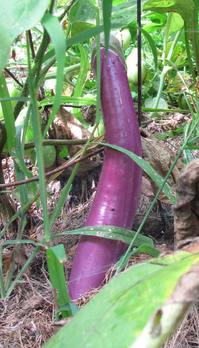Compost versus mulch: What's the difference?

Notice the thick layer of mulch under this ichiban eggplant.
Janice Leach | Contributor
A few weeks back, we posted about shredding leaves to use as mulch on our garden beds. A couple of readers stated that they composted their leaves before adding them to their gardens, which provided me the impetus for addressing two topics close to my heart and, more specifically, their differences.
What is the difference between mulch and compost?
Technically speaking, compost is organic matter that has been decomposed. The easiest way to make compost is to pile up garden refuse, kitchen scraps and lawn clippings, and wait a year.
We humans have devised some ways of speeding up that process, like paying attention to the “formula” of parts (two parts 'brown/dry' to one part 'green/juicy' is a general guide), of turning and watering as needed and of using different style bins or containers.
Compost that has fully decomposed is sometimes referred to as humus. Humus is usually dark brown in color and has a mild, pleasant smell. If your compost smells, it’s not yet finished breaking down.
Finished compost has many uses. Compost can be added or dug into garden beds while the soil is being turned. When planting new plants, you can add compost to the hole. (It’s usually a bad idea, however, to fill up the hole with only compost. That creates such special comfy place that plants don’t want to send their roots out into the regular soil, which inhibits their growth.)
Compost can be used to “side-dress” plants already in the ground by spreading the compost next to the plant and working it into the soil with a small garden fork. Compost can also be added to the mixture in which you start new plants or seeds.
We don’t use compost as mulch however. Compost is full of nutrients that we want to get down in the soil to feed the plants through their roots.
In contrast, mulch is the layer of organic materials placed on the top of the soil as a protective cover. Mulch helps to suppress weed germination, retain moisture, insulate the soil and reduce erosion. Mulch also contributes nutrients the soil by gradually breaking down over time.
During the gardening season, we heavily mulch our garden beds with grass clippings, straw and shredded leaves. From our point of view, leaf mulch is such a fantastic mulch that the 60 minutes once a year that we spend shredding leaves is a worthwhile effort. Our electric shredder is a little bit louder than a lawnmower and makes quick work of this simple task.
On the perennial beds, we like to use purchased cedar chips as mulch. In addition to a pleasant appearance, cedar chips break down slowly, providing coverage for several seasons. Cedar is also reputed to discourage some types of insects.
Compost and mulch are the two organic gardening approaches that have improved our soil tremendously over the years. We’ve seen the soil change from being “fudge” to becoming “cake,” to quote Jim’s metaphors.
Using both compost and mulch in the garden are simple changes with huge impacts on growing plants, cutting down on weeds and improving soil.
Janice and Jim Leach have been gardening together for close to 30 years. They tend a backyard plot in downtown Ann Arbor, where they try to grow as many vegetables and other plants as possible. For the last four years, they've published gardening tips, photos, and stories at their 20 Minute Garden website.


Comments
Craig Lounsbury
Sun, Jun 19, 2011 : 8:16 p.m.
Something I didn't know. I find it a bit amusing that a post would get deleted in a thread about gardening.
katie
Mon, Jun 20, 2011 : 7:13 a.m.
I thought so, too. I figured it was because of the materials sometimes used in compost, which has the initials, B.S. or Cow Pucky.
Dot
Mon, Jun 20, 2011 : 2:44 a.m.
maybe an inappropriate comment on the *ahem* specimen in the photo. ditto:: good, useful info
aareader
Sun, Jun 19, 2011 : 2:15 p.m.
Thanks for the information.